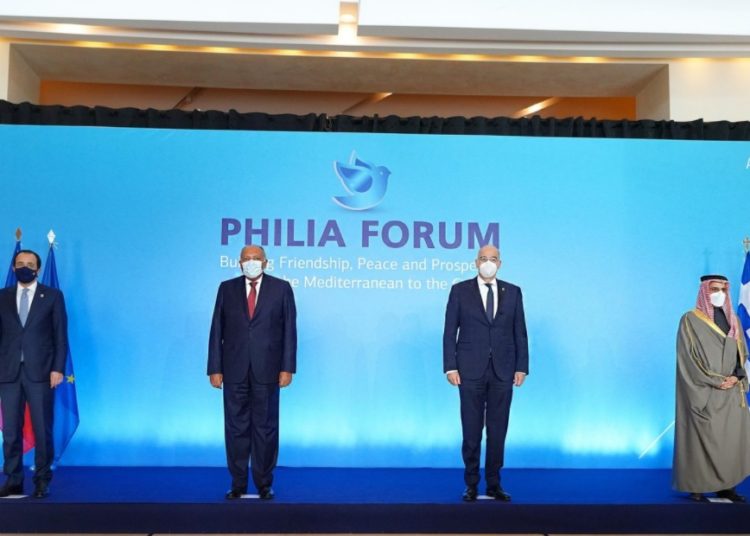An anti-Erdoğan alliance is deepening its relations and expanding cooperation in strategic areas despite diplomatic moves by the government of Turkish President Recep Tayyip Erdoğan to ease tensions with regional countries.
The first Philia Forum, an initiative of the Greek government aiming to bring together countries of the east Mediterranean, was held in Athens on February 11 with the participation of representatives from European and Arab states at a time when Turkish Foreign Minister Mevlüt Çavuşoğlu was touring the Gulf to strengthen Turkey’s relations with its Arab states.
Çavuşoğlu paid official visits to Kuwait, Oman and Qatar on February 9-11 and had talks with his counterparts in the region.
The forum is the latest step of regional countries to further enhance their cooperation and confront Turkey in the eastern Mediterranean. The Turkish government was holding out the possibility of better ties with the Gulf states and also seeking to improve relations with the European Union.
The Turkish Foreign Ministry has slammed the forum, declaring it an attempt to form a “hostile” alliance against Ankara. “It is not possible for any forum not including Turkey, the key country in its region, and Turkish Cypriots, to constitute an effective and successful mechanism of cooperation and friendship with regard to the challenges in the region,” the foreign ministry spokesman said.
The Philia Forum was held with attendance of ministers from Greece, Cyprus, Egypt, Bahrain, Saudi Arabia and the United Arab Emirates. France also attended the meeting as an observer.
According to the joint statement, forum participants agreed on improving cooperation in energy, innovation, digital economy, civil protection and people-to-people contacts. The ministers also exchanged views on regional issues including developments in the Middle East Peace Process, the Cyprus issue, Syria, Libya, Yemen and the eastern Mediterranean.
“[W]e also explored possibilities for further cooperation in the fields of science, agriculture, food security, academic education and training, interfaith dialogue, culture and sports,” the statement underlined.
“What unites us all today is the condemnation of illegal acts, the condemnation of irrational acts that undermine peace and security,” Greek Foreign Minister Nikos Dendias said at a press conference after the forum.
A day before the forum, President Erdoğan accused Greek Prime Minister Kyriakos Mitsotakis of “not knowing his place,” saying Mitsotakis had “provoked” him. Shortly after the low-level exploratory talks between Turkey and Greece in Istanbul, a war of words erupted between Erdogan and Mitsotakis over the negotiations on Cyprus and territorial rights in the eastern Mediterranean.
NATO members Greece and Turkey remain locked in a dispute over boundaries and offshore resource rights in the eastern Mediterranean that had led to a dangerous military buildup in the region for months last year.
In January 2020 the foreign ministers of Egypt, France, Cyprus and Greece met in Cairo. Italian Foreign Minister Luigi Di Maio was also present at the meeting as an observer. The foreign ministers discussed regional developments and agreed to denounce deals signed between Turkey and the Libyan Government of National Accord (GNA).
Turkey’s diplomatic and military efforts to control the eastern Mediterranean also accelerated the signing of the EastMed pipeline project. On the second day of 2020, Israel, Greece and Cyprus signed an agreement for the EastMed project to ship gas from the eastern Mediterranean to Europe. During the signing ceremony on January 2, 2020, Israeli Prime Minister Benjamin Netanyahu invited other countries, especially Italy and Egypt, to join the project, emphasizing that the EastMed would help stabilize the wider region.
The EastMed pipeline includes 1,300-kilometer offshore and 600-kilometer onshore pipeline sections and will transport natural gas from Israel to Greece and Italy. The cost to lay the pipe from the eastern Mediterranean to Italy is estimated to be 6 billion euros.












